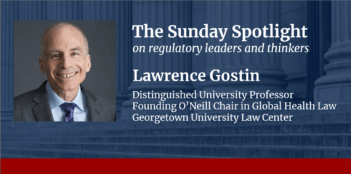
Scholars argue that federalism has hindered the U.S. response to the COVID-19 pandemic.
The United States has reported over 18 million cases of COVID-19 since March. Efforts to control the pandemic differ from state to state because the U.S. government is a federalist system, meaning that governing powers and responsibilities are divided between federal and state governments.
This federalist system has and will continue to hamper responses to the pandemic, three researchers from Boston University argue in a recent paper.
Matters of public health primarily fall within the authority of states, which results in inconsistent pandemic-related policies. For example, Michigan declares an outbreak whenever two infections arise in the same workplace, but Iowa waits to declare an outbreak until 10 percent of a business’s employees are infected. Declaring an outbreak triggers measures to stop further spread of the disease.
In their recent paper, Nicole Huberfeld, Sarah Gordon, and David Jones argue that, even with guidance from the national government, federalism leaves social programs under the control of state leaders whose priorities may lie elsewhere. Instead of working to improve the social determinants of health—such as socioeconomic status, housing security, and access to health care—state policies can exacerbate them, Huberfeld, Gordon, and Jones write.
For instance, Mississippi’s Medicaid eligibility threshold ranks among the lowest in the country, which means that people face more challenges to qualify for Medicaid. Even before the pandemic, many rural Mississippi hospitals faced possible closure due to high rates of uncompensated care. Now, rural hospitals are in even greater danger of closure because poor populations are at greater risk of infection, so the number of uninsured patients is likely to increase.
Huberfeld, Gordon, and Jones argue that the social determinants of health that make certain populations, such as low-income individuals and people of color, more vulnerable to infection will also hinder their economic recovery once the pandemic has passed.
The pandemic may also have lasting effects on how states finance safety net programs, Huberfeld, Gordon, and Jones predict. Because most state governments must balance their budgets, pandemic-related policies divert funding from resources originally allocated to other programs. Although the federal government may help fund and coordinate states’ pandemic responses, the federal government’s aid to states during the pandemic has been inconsistent.
Huberfeld, Gordon, and Jones worry that strain on state budgets may have a disastrous effect on Medicaid programs and ultimately on public health. They explain that more people apply for Medicaid in times of economic decline. As the pandemic continues to harm the economy, the need for Medicaid will only increase. Although the federal and state governments share the cost of Medicaid, states facing budgetary issues may be forced to reduce their Medicaid programs, which would be disastrous given the current public health crisis, Huberfeld, Gordon, and Jones warn.
They acknowledge that the federal government has temporarily directed additional money to states through the Families First Coronavirus Response Act and the CARES Act. In response, some states have made short-term amendments to their Medicaid programs to improve access to care. For example, many states have expanded access to telehealth care and have increased provider compensation for telehealth care. Huberfeld, Gordon, and Jones, however, argue that these measures are insufficient.
In the near term, states need to expand both access to and coverage under Medicaid, Huberfeld, Gordon, and Jones recommend. Because Medicaid providers often have close ties to the communities they serve, they are better equipped to treat patients that may otherwise be suspicious of the medical system. Also, expanding Medicaid could close the health insurance coverage gap and protect “the health and economic security of” an estimated 2.3 million people, Huberfeld, Gordon, and Jones predict.
They fear that until America rolls out a widely available vaccine and the economy recovers, low-income individuals and people of color will remain the most vulnerable to the pandemic’s effects. They recommend amending the Medicaid Act to make Medicaid financing more flexible so that health care provision can adapt to fluctuations in unemployment more efficiently. They also suggest reinstating rules to ensure sufficient payment of Medicaid providers to address the shortage of Medicaid providers.
In the long term, policymakers should focus on making access to health care and health insurance universal and equitable, Huberfeld, Gordon, and James urge. Policymakers should also create a new form of supplemental insurance that can help people who have insurance but cannot afford out-of-pocket costs. Huberfeld, Gordon, and James advocate restructuring the health insurance system to decouple access to insurance from employment status. In the end, they call on policymakers to shift their focus from increasing access to health coverage to achieving health.



